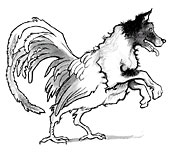|
China entering the Year of the Wedding
(New York Times)
Updated: 2006-01-29 14:46
Woman wishing to marry might try to hurry the process along, slyly dropping
hints about rings or blatantly pressuring boyfriends to pop the question. But
not Jennifer Chung.

Ms. Chung, who is Chinese-American, held off her wedding plans until just the
right moment so she could get married in the Year of the Dog, which begins
today, the first day of Chinese New Year.
Her reasoning was based on luck, not logistics. Ms. Chung, 29, an account
supervisor at Gigante Vaz Partners, an advertising agency in New York, considers
the Year of the Dog to be an auspicious one for weddings. Last year, the Year of
the Rooster, was thought to be particularly unlucky for marriages.
The reason many Chinese (and half-Chinese) couples are choosing Dog wedding
dates over Rooster ones traces back to the solar calendar. The Year of the
Rooster, which began on Feb. 9, 2005, and ended yesterday, did not contain a
lichun, or beginning of spring. (Lichun usually falls on Feb. 4, the halfway
point between the winter and summer solstices.) A year without a lichun is
called a "widow year" or "blind year," explained Theodora Lau, the author of
"The Handbook of Chinese Horoscopes" (HarperCollins, 2005). "The thinking is
that if you get married in a blind year, you didn't look at what you were doing,
and you could get divorced next year."
Many couples, both tradition-minded and modern, took notice, postponing
wedding plans last year. (According to articles in the Asian press, would-be
brides and bridegrooms in China shunned the Rooster in large numbers, often
leaving wedding-related businesses there with empty reception halls.)
The Year of the Dog, which will end Feb. 17, 2007, will span two lichun, Ms.
Lau said. "It's very lucky to see spring in the beginning of the year and in the
end. A lot of people would love to get married in a double-spring year."
In late 2004 Ms. Chung's mother first mentioned the significance of the
calendar to her daughter. "It stuck in my mind," Ms. Chung recalled. She then
relayed the concern to her boyfriend, Jay Wilkins, who had already asked Ms.
Chung's parents for her hand in marriage. Fortunately he was on board for a Year
of the Dog wedding. They'll walk the aisle in March.
Ms. Lau said this phenomenon, which occurs every five years, has long drawn
couples to the altar. "Ancient matchmakers would tell parents who were paying
for the weddings, 'This is a lucky, prosperous year.' " she said. "It was a way
to draw in business."
It still is. Albert Chu, manager of the Golden Bridge Restaurant in Chinatown
in New York, says "the two springtimes" ought to create a surge in wedding
banquets. "We've had a lot of calls asking to reserve the party room," he said.
Johnson Lau, owner of Highlight Studio Wedding Center, a Chinatown wedding
planner, said his business has recovered from the 20 percent dip in bookings he
experienced last year. "We've already booked 50 for this coming year," he said.
For other Chinese-American fiancées, marrying in the Year of the Dog is not
as clear a choice as it might seem. Peggy Pei-Yi Hwan, 32, a research analyst at
Standard & Poor's in New York, is also planning a Year of the Dog wedding.
Upon reflection, a Rooster date would have been cause for some concern. "My
family is superstitious, and I've inherited that to an extent," she said. "Part
of me is relieved that I'm not getting married in a year that is considered bad
luck."
She and her fiancé, Geordie Hebard, settled on a March wedding, but once a
date was determined, the couple was unexpectedly whipsawed by another cultural
and religious issue: Lent.
"We had a hard time finding someone who would marry us," said Ms. Hwan, who
was raised as a Protestant. "It's considered a sacred time, so a lot of
conservative Episcopalian ministers won't perform the service." The couple has
secured a willing officiant for their March 4 ceremony, luckily.
|